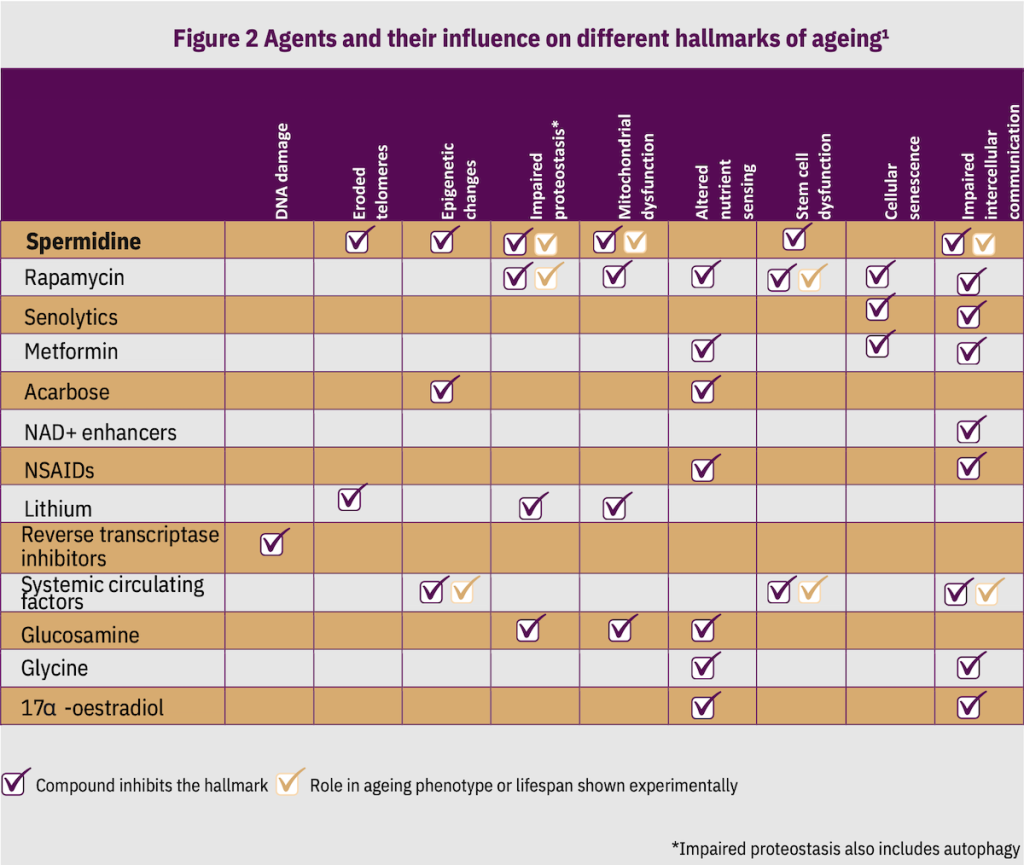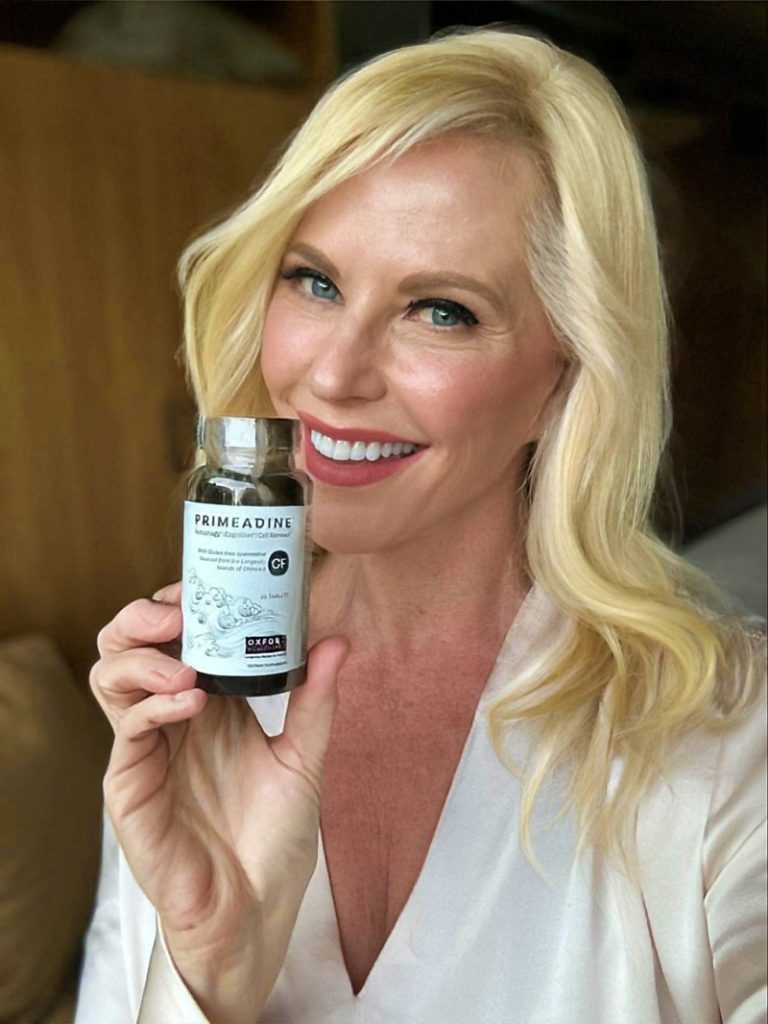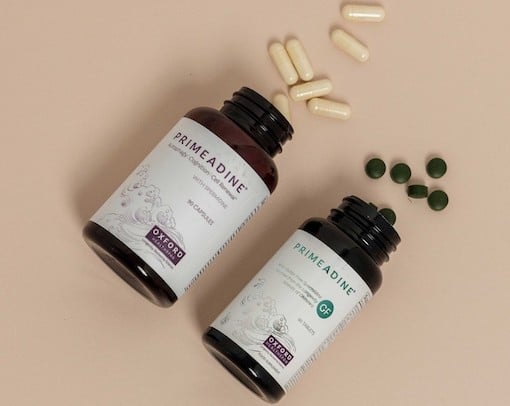You will find below a white paper and medical references regarding the Spermidine longevity supplement I recommend from Oxford Health Span’s Primeadine products.
“This Vital Compound, Discovered By Ancient Taoist Masters, Protects Your Sexual Functions… Is A Key To Longevity.”
Spermidine, found in breast milk and semen, regulates nine of the 12 hallmarks of aging. Now isolated from wheat germ—or chlorella for those who are gluten-free—it reverses aging so well you can see and feel it.
Supplementation with food-derived spermidine in humans has been shown to support cognition and heart health, promote hormonal balance, improve hair growth and fullness (including eyelashes and brows), and strengthen nails.
As our clients have noticed, other benefits include deeper, sounder sleep, hair color repigmentation, enhanced energy levels, brighter, more supple skin, and improved gut health.
Primeadine’s versions are superior to any on the market. Many synthetic Spermidine products are being sold that I do not recommend in this case.
“If you’re going to take ONE supplement daily for longevity, it’s Primeadine.”—Susan Bratton, Sexual Biohacker.
 |
Members Only Content Please login or register for a Free Membership to view this content. |
Epidemiological studies have correlated higher spermidine levels with longer life.

Where Is Spermidine Found?
Your gut biome and body tissues produce 2/3 of your body’s spermidine. The final 1/3 comes from your diet.
As we age, our ability to produce spermidine declines, making us much more reliant on food-derived, supplemental sources of spermidine.
Spermidine is present in all plants but is abundant in wheat germ, the long-fermented Japanese soybean dish, Natto, shiitake mushrooms, and peas. Oxford Health Span makes a gluten-free version of Okinawan Chlorella.
 |
Members Only Content Please login or register for a Free Membership to view this content. |
Spermidine Targets 9 Of The 12 Root Causes Of Aging
The primary mechanism it uses is activating autophagy, a cellular “clean up” and recycling process so fundamental that the Japanese scientist Yoshinori Ohsumi, who explained how it works, won the Nobel Prize in 2016.
Impaired autophagy
If you never took out the trash, it would pile up, decompose, and impede how things ran and looked in your home. This is precisely what happens inside your body when it can no longer trigger autophagy, which spermidine activates.
Mitochondrial dysfunction
As cells age, their mitochondria (the “cell powerhouse”) lose the ability to provide cellular energy and start self-destructing, creating oxidative stress. This is felt as low energy levels, and spermidine combats this by triggering mitophagy (autophagy within the mitochondria!).
Stem cell dysfunction
Stem cells lose their ability to divide with age, meaning old, dead cells can’t be replaced. As a result, you might exhibit the outward signs of aging, like gray hair and wrinkles. By triggering autophagy and increasing cell differentiation, spermidine can prevent stem cell dysfunction.
Inflammation
Heard the term “inflammaging”? It describes the gradual increase of inflammation associated with aging that can lead to various age-related diseases. Spermidine has an anti-inflammatory and antioxidant action, reducing systemic inflammation.
Telomere attrition
Telomeres are the end caps of chromosomes, and their length determines the number of times a cell can divide. When the telomeres are dysfunctional or unusually short, premature aging and age-related diseases occur. Cells can live longer when the telomere length is long or maintained—which spermidine promotes.
Gut dysbiosis
70% of your immune system lives in the gut, and one of its responsibilities is maintaining a balanced gut microbiome. Since the immune system loses effectiveness with age, it cannot perform this gut “housekeeping” role, and bacterial diversity suffers. Spermidine works to seal the tight junction proteins in the gut lining, promoting better gut health.
Epigenetic alterations
Your genome is like sheet music, and your epigenome is how that music is played. The sheet music is always the same, but your environment and lifestyle can influence how it is expressed. Without changing your lifestyle, epigenetic changes accumulate as you age.
Loss of proteostasis
Loss of proteostasis refers to poor protein folding. Proteins handle nearly every task in your body, including cell shape, waste cleanup, inner cell organization, and routine maintenance. To function properly, proteins need to be folded perfectly. Spermidine helps with this by inducing autophagy.
Impaired intercellular communication
As cells age, they emit an increasing number of inflammatory signals, like “alarm bells,” to alert the body that they need to be repaired. But when chronically sounded, these alarms can cause “inflammaging” in surrounding cells. Spermidine inhibits this by inducing autophagy, cleaning up old, broken cells, and making way for new, healthy ones.
How Much To Take?
The US FDA has not ruled on a safe upper limit for food-derived spermidine. Still, the European Union’s European Food Safety Authority has deemed 6mg of supplemental food-derived spermidine to be the safe upper limit.
Most studies have used a daily dose of 1mg of food-derived spermidine, spermine, and putrescine.
Synthetic spermidine has not been tested for safety in humans. Watch out for fakes!
Oxford Health Span sources its raw materials from Japan, known for its Nobel Prize-winning scientific leadership on autophagy or cell renewal. It has the most advanced extraction process and is known worldwide for its rigorous quality control and testing. It also meets the standards of the Japan Health Food and Nutrition Food Association.
Their raw materials are manufactured in Japan in an FDA-registered and -inspected facility with ISO22000 standards, the highest in food quality control. Their raw materials are tested for heavy metals, mold, fungi, and bacteria at the Japan Food Research Lab (JFRL), a third-party independent testing lab. Every batch must be tested as food-derived spermidine will have varying quantities per batch. They must ensure that every batch contains the minimum effective dose of 1mg stated on our labels. In addition, their spermidine is encapsulated in an FDA cGMP facility in the USA and undergoes purity testing there at Eurofins or Delta.
Their capsules do not contain any synthetic ingredients, whereas other supplements contain magnesium stearate (of which circa 80% will contain hydrogenated fats; the supplement industry is not legally required to get rid of hydrogenated oils the way the processed food industry has been mandated by law to), shellac, talc, and glycerin. Their products are all suitable for vegans.

“My Eyelashes and Eyebrows are Growing Thicker”
“Primeadine is the only longevity supplement that supports 9 of the 12 hallmarks of aging. Even better, they have the only gluten-free version of spermidine. I take this morning and evening and my hair color is returning, my eye-sight is improved and my eyelashes and eyebrows are growing thicker. These are only the external manifestations of this powerful anti-aging supplement. Oxford Health Span is a QUALITY company too.”
— Susan Bratton, Sexual Biohacker
Watch Out For Inferior Product Tricks
The Primeadine formulation contains a special type of prebiotic fiber called FructoOligoSaccharide (FOS), which selectively feeds the friendly spermidine-producing bacteria in the gut biome. The idea is to increase supplemental or ‘exogenous’ spermidine and encourage your body’s natural ability to produce ‘endogenous’ spermidine.
Oxford Health Span does not use liposomes in Primeadine because this is unnecessary for absorption and would prevent the benefits of spermidine exposure to the gut lining. There is no evidence that the cells cannot take up spermidine alone. Like amino acids, polyamines do not need a liposome to cross into the cell or be taken up with epithelial cells. The process of creating a liposomal version also creates unnecessary expense.
They do not synthetically enrich their product with synthetic spermidine.
They do not use doses beyond what the European Food Safety Authority (EFSA) has mandated as safe for human consumption, which is 6mg daily. Please note that this is related to food-derived spermidine. Synthetic spermidine and synthetically enriched spermidine have never been tested in humans for safety or efficacy and are being sold without regulatory oversight.
They work closely with their impressive body of scientific and clinical advisers at the University of Oxford, all of whom take their product and share it with their families. The company is also the only non-Japanese member of the Japan Autophagy Consortium, whose Senior Adviser is the 2016 Nobel Prize Winner in Medicine or Physiology, Prof Yoshimori Ohsumi, and whose Director is Prof Tamotsu Yoshimori, Osaka University. Prof Yoshimori conducted all the mammalian research in autophagy, which helped underpin Prof Ohsumi’s work on yeast cells.
They take great care in using the highest quality ingredients and keeping out the ‘nasties’ commonly used in the supplement manufacturing process in our products. They use the highest quality ingredients – no industrial seed oils such as wheat germ oil that oxidizes rapidly, no magnesium stearate to make the powder flow faster through automated encapsulation equipment (approximately 70% of all magnesium stearate used as ‘flow agents’ are hydrogenated industrial seed oils), no talc to make the powder denser to fit more compactly into fewer capsules.
They also do not use synthetic spermidine, which is very cheap and often ‘cut’ into products stating ‘wheat germ with spermidine.’
They choose food-derived spermidine. Yes, it is more costly, just as the best cake ingredients for your birthday cake would be. It’s a choice and philosophy about value for money.
If you’re going to work on your longevity, my current best recommendation is Primeadine Regular or Gluten Free.
 |
Members Only Content Please login or register for a Free Membership to view this content. |
Here is a white paper with even more data. References are linked below.
References:
1. López-Otín, C., Blasco, M. A., Partridge, L., Serrano, M., & Kroemer, G. (2013). The Hallmarks of Aging. Cell, 153(6), 1194. https://doi.org/10.1016/j.cell.2013.05.039
2. Hofer, S. J., Simon, A. K., Bergmann, M., Eisenberg, T., Kroemer, G., & Madeo, F. (2022). Mechanisms of spermidine-induced autophagy and geroprotection. Nature Aging, 2(12), 1112-1129. https://doi.org/10.1038/s43587-022-00322-9
3. Madeo, F., Bauer, M. A., Carmona-Gutierrez, D., & Kroemer, G. (2019). Spermidine: A physiological autophagy inducer acting as an anti-aging vitamin in humans. Autophagy, 15(1), 165-168. https://doi.org/10.1080/15548627.2018.1530929
Disclaimer: We frequently partner with companies providing products and services featured on our website in an affiliate relationship. We vet the products in advance to ensure they are trusted resources and recommend you research before purchasing. We welcome your feedback and recommendations. If you buy one of the products we recommend or click on one of the links in this article, we may receive a commission. Thank you for supporting us!

